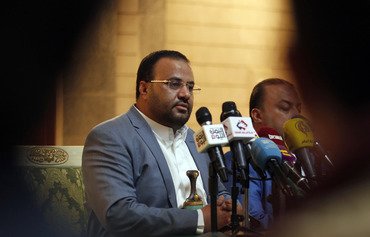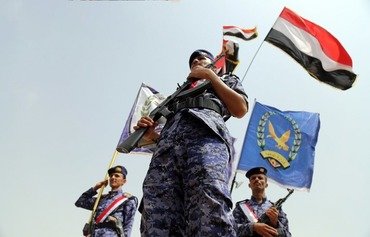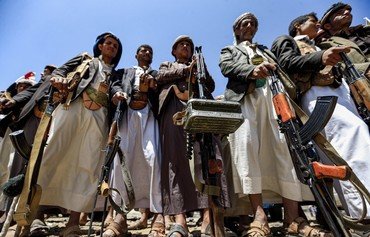ADEN -- Internal divisions within the Houthis have driven the leader of the Iran-backed group, Abdul-Malik al-Houthi, to make a controversial political appointment, Yemeni sources with knowledge of the situation said.
The so-called Supreme Political Council on July 17 approved the extension of Mahdi al-Mashat's presidency for three consecutive terms, effective August 24, Houthi-affiliated media outlets reported.
The move violates the agreement forged in July 2016 with the General People's Congress (GPC) party, when the Supreme Political Council was formed, which stipulated a rotational presidency among the 10 council members.
Al-Mashat has served as president of the Supreme Political Council since April 2018, when he was appointed to succeed Saleh al-Samad, after al-Samad was killed in an air strike.
![Mahdi al-Mashat, who was appointed to succeed Saleh al-Samad as head of the Houthis' Supreme Political Council, prays during al-Samad's funeral at a Sanaa mosque on April 28, 2018. [Mohammed Huwais/AFP]](/cnmi_am/images/2021/08/06/31051-Mahdi-al-Mashat-600_384.jpg)
Mahdi al-Mashat, who was appointed to succeed Saleh al-Samad as head of the Houthis' Supreme Political Council, prays during al-Samad's funeral at a Sanaa mosque on April 28, 2018. [Mohammed Huwais/AFP]
![The GPC's partnership with the Houthis effectively ended in December 2017, after they killed former Yemeni President Ali Abdullah Saleh. Houthi elements are seen here on January 3, 2017. [Mohammed Huwais/AFP]](/cnmi_am/images/2021/08/06/31043-Houthi-fighers-Sanaa-600_384.jpg)
The GPC's partnership with the Houthis effectively ended in December 2017, after they killed former Yemeni President Ali Abdullah Saleh. Houthi elements are seen here on January 3, 2017. [Mohammed Huwais/AFP]
Several sources told Al-Mashareq that al-Houthi had kept al-Mashat in power to block the path of those in his group and his partners in the GPC who aspire to take over the leadership position.
"The conflict today is within the militia," said GPC general committee member Adel al-Shujaa, referring to the Houthis. "The extension of al-Mashat's presidency came as a result of the conflict and the race for power."
Based on the Houthis' assessment of social standing, he said, Mohammad Ali al-Houthi sees himself more entitled to head the political council than al-Mashat, who descends from a non-Hashemite family.
Mohammad Ali al-Houthi was one of the field commanders who led the 2014 coup in which the group seized control of Sanaa from the Yemeni government.
He later chaired the Supreme Revolutionary Council, which the Houthis formed as an interim governing body in 2015.
The Supreme Revolutionary Council, which was not recognised by the United Nations or the Gulf Co-operation Council (GCC), among many others, ceded power to the Supreme Political Council in 2016.
Though the Supreme Political Council is the de facto governing body in Houthi-controlled areas of Yemen, it is widely considered illegitimate.
Houthis' rift with GPC
The GPC's partnership with the Houthis effectively ended in December 2017, after they killed ex-Yemeni president Ali Abdullah Saleh, their former ally in the ongoing war, who was then-director of the GPC, al-Shujaa said.
"The GPC leaders who have remained in this farcical partnership comprise a Houthi-affiliated wing, and their presence is nominal -- both in the council and within the Houthi-affiliated government," he said.
According to political analyst Faisal Ahmed, Abdul-Malik al-Houthi's vote of confidence in al-Mashat was "mainly due to the fact that there is no trustworthy alternative".
It is also because al-Mashat obeys the directives of Iran's Islamic Revolutionary Guard Corps (IRGC), the Houthis' main backer, he said.
Although al-Mashat is "a weak figure who does not have staunch support among prominent Houthi leaders, Abdul-Malik al-Houthi renewed the vote of confidence in him to close the door on senior figures who were seeking to remove al-Mashat from his position", Ahmed said.
Deputy Minister of Justice Faisal al-Majeedi said the renewal of al-Mashat's position is a service to Iran and also reflects the Iranian regime's leadership style, with one figure exercising authority over all state institutions.
Al-Mashat's presidency term was extended as he used to direct Abdul-Malik al-Houthi's office, al-Majeedi said, noting that he is an obedient servant of al-Houthi, who is in turn subservient to Iranian ambassador Hassan Eyrlou.
Yemeni officials say Eyrlou is directing military operations in Houthi-controlled areas, including the militia's ongoing assault on the city of Marib.
Under international law, the Houthis have no legal authority in Yemen as they hijacked the state during their 2014 coup and seized control of its institutions.
"They should really be described as a group of thieves," al-Majeedi said.

![A pro-Houthi fighter visits the grave of slain Houthi political chief Saleh al-Samad in Sanaa on January 11. The portraits behind him show al-Samad, Houthi leader Abdul Malik al-Houthi, and Mahdi al-Mashat, who replaced the slain political leader. [Mohammed Huwais/AFP]](/cnmi_am/images/2021/08/06/31052-Sanaa-Mashat-poster-600_384.jpg)







Houthis are of Persian origins.
Reply11 Comment(s)
Fiascos!
Reply11 Comment(s)
There is no god but Allah and Muhammad His Messenger!
Reply11 Comment(s)
Amazing!
Reply11 Comment(s)
Excellent
Reply11 Comment(s)
Yes
Reply11 Comment(s)
God is greater!
Reply11 Comment(s)
Iran's dogs
Reply11 Comment(s)
They're Ansarallah!
Reply11 Comment(s)
The rafida (rejectionist) Houthis are the lackeys of the Magi Persian state, and we won't accept them even in our graves.
Reply11 Comment(s)
The programme is beautiful
Reply11 Comment(s)